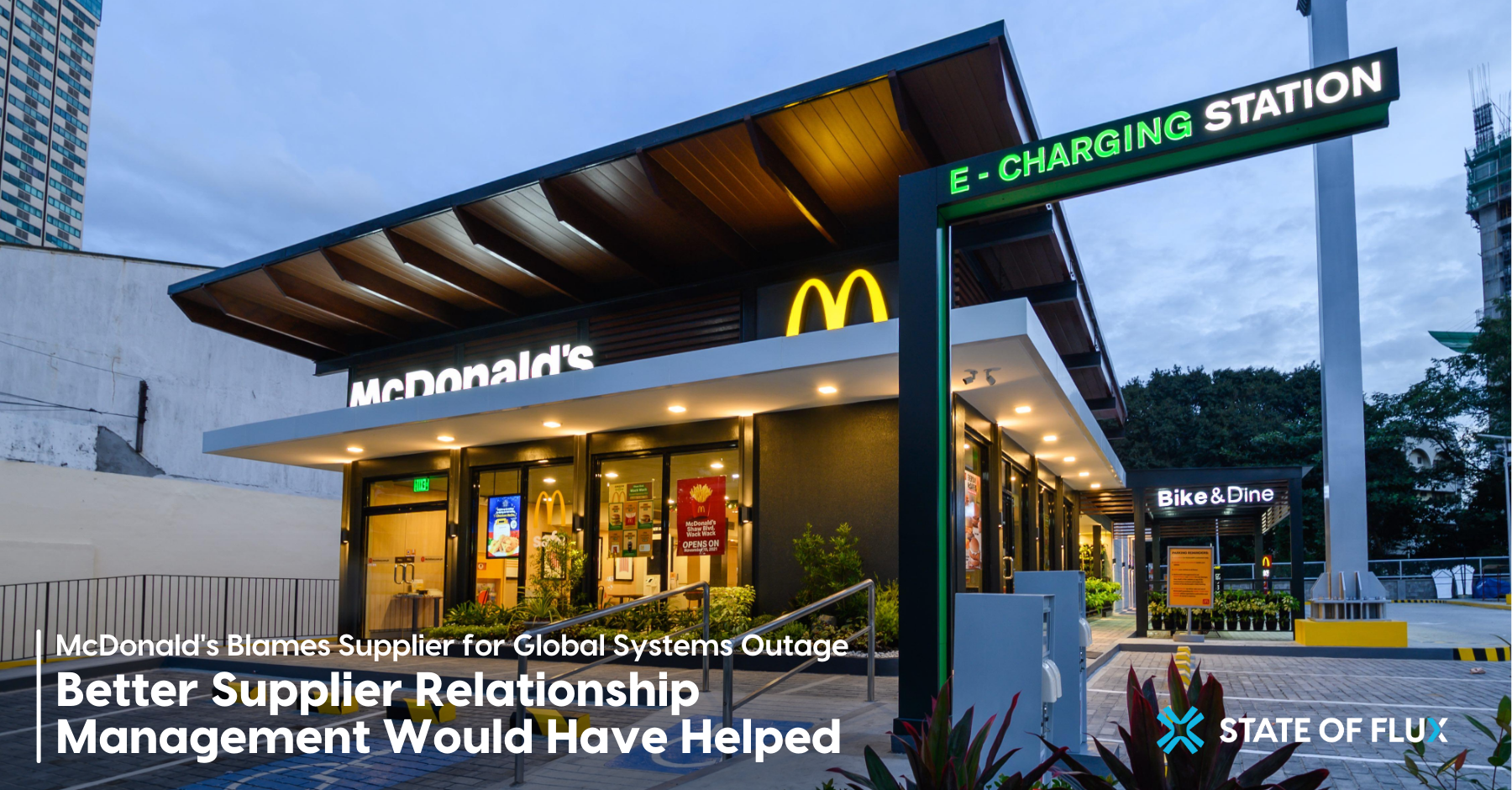
McDonald's Blames Supplier for Global Systems Outage - Better Supplier Relationship Management Would Have Helped
McDonald's recent global systems outage (BBC news) was not just a technical glitch; it was a wake-up call for the fast-food giant and the industry at large. The outage, which McDonald’s has blamed on a Supplier, disrupted their operations worldwide, resulting in significant financial losses and eroded customer trust. However, the cost of this outage far outweighs any investment in implementing a robust, consistent, and structured supplier relationship management (SRM) program.
The fallout from the outage was extensive. Customers faced delays in placing orders, processing payments, and receiving deliveries. Some stores were forced to close temporarily, while others struggled to cope with the influx of frustrated customers. The negative impact on McDonald's brand reputation and revenue cannot be overstated.
McDonald’s has squarely placed the blame for this issue with a third-party supplier McDonald's chief information officer Brian Rice, said. the company experienced a "global technology system outage, which was quickly identified and corrected", Rice added "Notably, this issue was not directly caused by a cybersecurity event - rather, it was caused by a third-party provider during a configuration change".
In our 20+ years of SRM experience, suppliers rarely are solely to blame for disruption and outages and in fact in the majority of the time, it is something the customer organization does that impacts the suppliers ability to deliver. However, most organizations are poor at managing their large supplier relationships. The latest State of Flux annual global SRM research shows that only 8% of organizations would have developed their SRM programs enough to be considered SRM leaders.
That same research also showed that for the large majority (>90%) of organizations, suppliers were directly involved in delighting customers – or disrupting as in this McDonald’s case. The importance of suppliers in providing end customer service is huge and continuing to grow as outsourcing and/or servicization (where an organization shifts from a product-centric to a service-centric business model) continues at a pace. The latest research focused on the ‘Extended Enterprise’ and the concept that organizations are only as good as their worst supplier. So, whilst McDonald’s can blame the supplier for the outage, this is a direct reflection on McDonald’s as they chose and manage this supplier.
All industry insights in one E-Book
/Step-in-Clause-Risk-Mitigation-or-Supplier-Bullyin/Landing-Page-Large.png?width=680&height=200)
Download the SRM Research Report 2023 and get access to data points from over 300 companies (anonymously), 6 Case Studies and many more articles.
Would McDonald’s have been able to avoid this disruption with a better SRM program? It is difficult to tell if it could have been completely avoided, but a strong SRM program would certainly have helped mitigate the risks. Investing in SRM helps enhance resilience and mitigate risks, you know the supplier better, the governance structure is stronger and the performance metrics would provide early warning indicators that things could go wrong.
The research tells us that SRM implemented well, minimizes the likelihood of future outages but also strengthens the organization's ability to respond effectively to unforeseen challenges. Additionally, proactive risk management measures, such as contingency planning and scenario analysis, can help mitigate the impact of potential disruptions on business continuity.
In addition, well-managed supplier relationships drive innovation and foster competitive advantage. By being considered a customer of choice and collaborating closely with suppliers to co-develop new products, improve existing offerings, and explore market opportunities, organizations can stay ahead of the curve and differentiate themselves in increasingly crowded marketplaces. Rather than experiencing these types of disruptions McDonald’s could be leveraging Supplier innovation leading to improved customer experiences, driving loyalty and revenue growth, something that they had previously been known to do well.
Investing in SRM is not just about mitigating risks; it's about building strategic partnerships that create long-term value for all parties involved. By treating suppliers as strategic partners rather than mere vendors, organizations can leverage suppliers’ expertise, resources, and market insights to drive mutual success. This collaborative approach fosters trust, transparency, and shared goals, laying the foundation for sustainable growth and competitive advantage.
Consistently over the 15 years of our annual global SRM research we’ve seen that organizations will achieve between 3% and 6% additional benefit over and above contracted value if suppliers are managed well. Interesting from the same annual SRM research we’ve seen that cost or other Executive priorities are the key reasons why organizations don’t implement SRM programs.
Through this one incident McDonald’s will have seen that the cost of implementing an effective SRM program pales in comparison to the losses incurred during the outage. While there are upfront expenses associated with building and maintaining strong supplier relationships, the long-term benefits far exceed the investment.
While the recent global systems outage may have caught McDonald's off guard, it serves as a compelling reminder for all organizations of the critical importance of robust supplier relationship management. As the company works to recover from the fallout of the outage, investing in SRM should be a top priority to ensure resilience, agility, and competitiveness in an increasingly complex and interconnected business environment.
Want to know how good your SRM program is? Take the SRM survey www.srmsurvey.com to get a free benchmark or feel free to contact us on enquiries@stateofflux.co.uk to discuss your Supplier challenges today.
How good is your SRM program?
/Step-in-Clause-Risk-Mitigation-or-Supplier-Bullyin/Landing-Page-Large-(1).png?width=680&height=200)
A must for all organizations, supplier management is critical to the success (or failure) of your business. Click here to benchmark your organisation's supplier management for free, or visit www.srmsurvey.com.